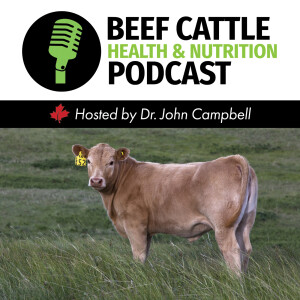Episodes

Thursday Jan 12, 2023
Thursday Jan 12, 2023
00:00 – 2:18 Welcome and Introductions 2:19 – 4:09 The importance of feed efficiency4:10 – 6:17 Explaining Residual Feed intake6:18 – 8:04 Measuring feed efficiency in research trials8:05 – 9:28 Limitations of feed efficiency measurements in beef cow systems9:29 – 12:27 Describing an alternative system for ranking beef cow efficiency12:28 – 15:18 Variability in the indicators of efficiency and why they were chosen15:19 – 7:30 Evaluating the digestive physiology in high efficiency and low efficiency cows17:31 - 19:45 Main differences between HE and LE cows19:46 – 23:37 Describing ruminal differences between HE and LE cows 23:38 – 25:00 Limitations and advantages of this research approach25:01 – 27:25 How to use this concept to select efficient cows on your own ranch27:26 – 29: 51 Wrap up and conclusions

Thursday Dec 22, 2022
Thursday Dec 22, 2022
00:00 – 2:51 Welcome and Introductions 2:52 – 4:02 Importance of neonatal calf diarrhea in cow-calf herds4:03 – 6:48 What are the pathogens that are associated with calf diarrhea?6:49 – 7:29 When are diagnostics important?7:30 – 8:42 Strategies to employ to minimize risk of diarrhea8:43 - 11:00 Sandhills calving system effectiveness11:01 - 13:15 How do you implement the Sandhill’s calving system?13:16 – 17:03 The Foothills Calving System17:04 - 19:10 How to implement a new calving system on your ranch19:11 – 20:31 Using these calving systems on more intensive operations20:32 – 22:10 Other challenges with implementing new calving systems22:11 – 25:43 The importance of colostrum and an easy method for deciding if a calf needs supplemental colostrum

Thursday Dec 15, 2022
Thursday Dec 15, 2022
00:00 – 1:37 Welcome and Introductions 1:38 – 3:32 Who is Animal Health Canada3:33 – 6:14 What is emergency health management mean?6: 15 – 10:21 Why is it important to be prepared for emergencies in livestock operations?10:22 – 12:37 The consequences of a serious disease outbreak12:38 - 14:38 What to do if you suspect an unusual disease outbreak14:39 - 16:31 What are the clinical signs of foot and mouth disease16:32 – 19:12 What happens once an exotic disease is reported?19:13 -20:10 The importance of premises identification20:11 - 24:28 What would happen once FMD was confirmed?24:29- 26:29 Where can producers go for help? 26:30 - 29:04 AHEM resources for producers29:05 – 31:00 Wrap up and summaryLink to Animal Health Emergency Management Website and Resourceshttps://animalhealth.ca/ahem/

Thursday Dec 08, 2022
Thursday Dec 08, 2022
00:00 – 1:57 Welcome and Introductions 1:58 – 3:24 Defining a low quality forage3:25 – 4:57 Common characteristics of low quality forages4:58- 7:05 How do they impact animal health and performance?7:06 - 9:57 Management issues to consider when utilizing lower quality forages9:58 - 14:04 The importance of identifying animal classes that can utilize these feeds14:05 - 16:03 Fiber levels impact on feed intake16:04 – 25:45 Supplementation when feeding low quality forages25:46-29:18 Post harvest physical treatments29:19-34:00 Post harvest chemical treatments34:01-38:51 Summary and Wrap up Link to a BCRC webinar where Dr. Ribeiro presents on this topichttps://www.beefresearch.ca/blog/nutrition-webinar-3-make-most-of-low-quality-forage/

Friday Dec 02, 2022
Friday Dec 02, 2022
00:00 – 02:08 Welcome and Introductions 1:50 - 3:30 What role does copper play in the body3:31 - 4:56 How commonly Is copper deficiency diagnosed?4:57 - 6:29 How does copper deficiency occur?6:30 – 9:37 Primary vs secondary copper deficiency (effects of molybdenum and sulphates)9:38 - 13:32 Clinical signs of mild to moderate copper deficiency13:33 – 16:40 How is severe copper deficiency manifested?16:41 – 22:53 How do we assess copper levels in animals?22:54 - 28:57 Dangers of Copper toxicity28:58 – 31:55 Approaches to dealing with copper deficiency issues31:56 – 34:50 Closing thoughts and wrap up

Wednesday Nov 23, 2022
Wednesday Nov 23, 2022
00:00 – 01:50 Welcome and Introductions 1:50 - 2:53 Age categories for young calf vaccinations2:53 – 5:07 What diseases can we vaccinate young calves for?5:07 – 9:03 Immune system development in the calf9:03 - 11:33 The effect of maternal immunity on vaccine response11:33 - 17:45 Intranasal vs Injectable Vaccines: What’s the difference?17:45 – 19:30 Evidence of vaccine protection against summer pneumonia of calves19:30 – 21:00 Intranasal vaccines currently available in Canada21:00 – 25:08 Best practices for administering modified live intranasal vaccines25:08 – 28:10 The importance of working with your veterinarian to design a vaccination protocolLinks to Related InformationVaccination of the Beef Herd https://www.beefresearch.ca/topics/vaccination-of-the-beef-herd/BCRC Webinar on Using Nasal Vaccines Effectively https://www.beefresearch.ca/webinars/using-nasal-vaccines-effectively/Blog article featuring intranasal vaccines https://www.beefresearch.ca/blog/intranasal-vaccines-are-timely-and-effective/

Wednesday Nov 16, 2022
Wednesday Nov 16, 2022
Link to BCRC website where Dr. Bart Lardner describes 7 tips for grazing corn https://www.beefresearch.ca/blog/seven-tips-for-grazing-corn/?utm_source=BCRC+Blog+Subscribers&utm_campaign=2b9ff72122-EMAIL_CAMPAIGN_2022_11_15_10_08&utm_medium=email&utm_term=0_8c6acbd1df-2b9ff72122-88320359Link to BCRC website page with extended grazing resourceshttps://www.beefresearch.ca/topics/extended-grazing/

Tuesday Nov 08, 2022
Tuesday Nov 08, 2022
00:00 - 01:45 Welcome and introductions01:46 - 02:54 Stressors in weaned calves2:55 - 04:29 Definition of Preconditioning04:30 - 05:50 Components of a preconditioning program05:51 - 09:43 Evidence associated with improved health in preconditioned calves09:44 -12:29 Average daily gain in preconditioned calves12:30 - 14:49 Ranch staff thoughts on low stress weaning14:50 - 16:53 How common is preconditioning or low stress weaning strategies?16:54 - 19:20 Is there an economic advantage to preconditioning?19:20 - 21:23 Concluding thoughts

Monday Oct 31, 2022
Monday Oct 31, 2022
00:00 - 01:07 Welcome and introductions01:08 - 4:47 Importance of feed testing - 3 main reasons4:48 - 06:28 How to collect samples from bales0:6:29 - 11:04 How to collect sileage samples11:05 - 12:43 Collecting grain samples12:44 - 14:26 Collecting samples from extended grazing forages14:27 - 17:03 Pooling feed samples - Disadvantages17:04 - 21:30 Wet Chemistry vs NIR analysis21:31 - 25:55 Key lab tests that need to be evaluated on feeds25:56 - 28:59 Specialty analysis such as nitrates, ergot, mycotoxin, sulphur analysis29:00 - 33:34 Where to go for help with feed analysisLink to BCRC feed testing analysis toolhttps://www.beefresearch.ca/tools/feed-testing-analysis-for-beef-cattle/#singleFeedContainer


